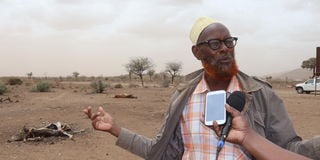Declare mental health problems an emergency, drought-hit Marsabit residents plead

Dabel division resident Mzee Abdi Boya shows the 200 carcasses of livestock that succumbed to drought on August 24, 2022. Most of the herders grapple with mental health challenges after losing nearly all their livestock.
The drought ravaging the vast Marsabit County has been blamed for increased mental problems in the area, with locals urging the government to declare it an emergency.
The effects of lack of rainfall are said to have led to a high number of locals suffering from mental health problems.
One of them is Mzee Abdi Boya, who lost nearly all his livestock to the drought.
“If you take a keen look at pastoralists today, most of them walk as they engage in intense monologues, an indication that they’re affected psychologically,” Mzee Boya said.
Out of more than 100 livestock Mzee Boya had before the drought hit, only eight cows remained.
He told Nation.Africa that Marsabit was facing the worst mental health crisis this decade, triggered in part by climate change impacts and drought.
He said losses caused by drought, flooding and other extreme weather events distressed pastoralists, for whom domestic animals are the economic mainstay.
He took us to the grazing fields around the only borehole that served nearly 5,000 residents of Dabel location. The field is strewn with over 200 animal carcasses.
Mr Boya has not received any psychosocial support and he mostly turns to prayers to cope.
He is a retired police officer and says life had become unmanageable and the future of his eight children, two of whom are in college and two in high school, was bleak.
For instance, his son who attends a college in the coastal region was unable to travel back to school due to lack of bus fare.
He painted a grimmer picture of poorer families who owned nothing.
Most households rely on friends and well-wishers for financial support.

Mzee Abdi Boya shows the emaciated cow belonging to his neighbour Abdullahi Adan at Dabel village on August 24, 2022 .Mr Adan is forced to feed his only remaining cow with maize in the hope that it might survive drought ravaging the county.
Putting food on the table is the greatest challenge.
Elle Borr resident Guyo Ali told Nation.Africa that the lives of nearly 300 households in the area had been turned upside down by ethnic conflicts and droughts.
Residents had to flee in 2020 amid heightened clashes between the Gabbra and Borana communities.
They are now trying to pick up the pieces from the ravages of the conflicts. But drought has made it extremely difficult for them to heal.
Stressful events caused by conflict and drought have triggered serious mental illnesses among residents, with some saying they have even contemplated taking their own lives.
“Some of the elderly persons in this area are grappling with suicidal thoughts, as they no longer feel there is anything left to live for after losing their sources of livelihood,” Mr Ali said.
Kureya Galmugle, a mother of five from the Orletitikes area in Korr location, told Nation.Africa that three of the children relied on school-feeding programmes to survive.
Inconsistent supplies
But those programmes were undermined by inconsistent supplies of food items by humanitarian agencies.
Getting water is also a major challenge in schools in the area as most boreholes have dried up.
Ms Galmugle was worried that two schools had reportedly shut down in Laisamis sub-county due to the effects of drought and her children could succumb to starvation.
More than 225,000 people were food-insecure in Marsabit County, while 66,000 rely on humanitarian agencies for relief food, said Henry Mustafa, the county coordinator for the National Drought Management Authority (NDMA).
At least one million domestic animals had succumbed to the drought in Marsabit alone.
Mr Mustafa agreed that the affected residents need psychological and psychosocial support.
Targeted psychosocial interventions are needed to save the lives of pastoralists grappling with mental health issues, said Kenya Red Cross Society Upper Eastern coordinator Maurice Anyango.
Nearly all food-insecure households in Northern Kenya faced mental health challenges as they constantly worried about where to get their next meal, Mr Anyango said.
Natural disasters
Extreme events such as floods, conflicts, droughts and landslides, he said, sometimes happened faster than the community’s ability to recover from previous natural disasters.
He urged counties and the national government to have a separate budget for mental health, adding that households need to be helped to take care of their mental health.
Mr Anyango said the Red Cross was providing psychosocial support to drought-affected residents in two categories.
The first is outreach and the second is an intense programme targeting individuals, who can reach help via the toll-free number 1199, day and night.
Marsabit Governor Mohamud Ali appealed to other agencies to partner with the devolved unit to cushion residents against the negative impacts of the drought.
He said the county and the national government had not developed programmes to deal with mental health challenges caused by the drought.
Task force
In December 2019, the government established a task force on mental health.
The team reported that at least 25 percent of outpatients and 40 percent of inpatients at health centres suffered from a mental illness.
Climate change is identified as a contributing factor in mental illness, particularly post-traumatic stress disorder.
The report showed that 75 percent of Kenyans could not access mental health care.
Kenya has only 71 psychiatrists for almost 50 million people.
The report also said that only about 22 of the 47 counties offered mental health services.
Consequently, most mental health cases are often misdiagnosed because of a lack of specialists.





